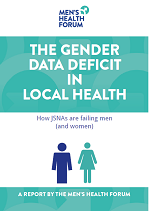A new report by the Men’s Health Forum shows how JSNAs are failing men (and women)

The Men’s Health Forum analysed all 147 available Joint Strategic Needs Assessments (JSNAs), the key document local authorities rely on to understand the health of men and women in their area.
The report shows that just 18% of JSNAs adequately used data broken down by gender. Key health indicators such as lifestyle and disease prevalence and mortality are infrequently recorded by gender. To tackle this, we prepared the report comparing how different local authorities cover the health needs of men and women in their JSNAs – and providing helpful insight into how this can be improved.
Read The Gender Data Deficit in Local Health.
Key messages
- The majority of local authorities are not addressing men’s health. Only 27 out of 147 (18%) had a majority of their measures in their JSNA local and gendered, that is broken down to show figures for men and for women in their area.
- Worryingly, areas with poor male life expectancy are not necessarily prioritising men’s health, despite the numbers of men in their area who are dying young.
- Local authorities are failing to recognise the importance of men’s mental health. Mental illness and mental health diagnosis rates were included by gender in just a handful of JSNAs yet 78% of people who take their own lives are male.
- Key lifestyle areas are regularly being overlooked. Only alcohol is included as a gendered measure in the majority of the JSNAs. Too often diet, smoking and sexual health are neglected.
- Figures on disease prevalence and related hospital admissions which affect men considerably more, such as cancer and coronary heart disease are not gendered leaving key gaps in the understanding of survival and the burden of disease.
The Men’s Health Forum has outlined areas of best practice where JSNAs have used local gendered data. The report also calls on local authorities to use the gendered data available and for more data to be collected nationally and locally by gender.
This project is part of the Men's Health Forum's work as a strategic partner of the Department of Health, NHS England and Public Health England.
More Info
- The Gender Data Deficit
- Listen to the audio - Interview with report author Ed Bevan
- Men's Health Manifesto
- Haringey Health Data Report
